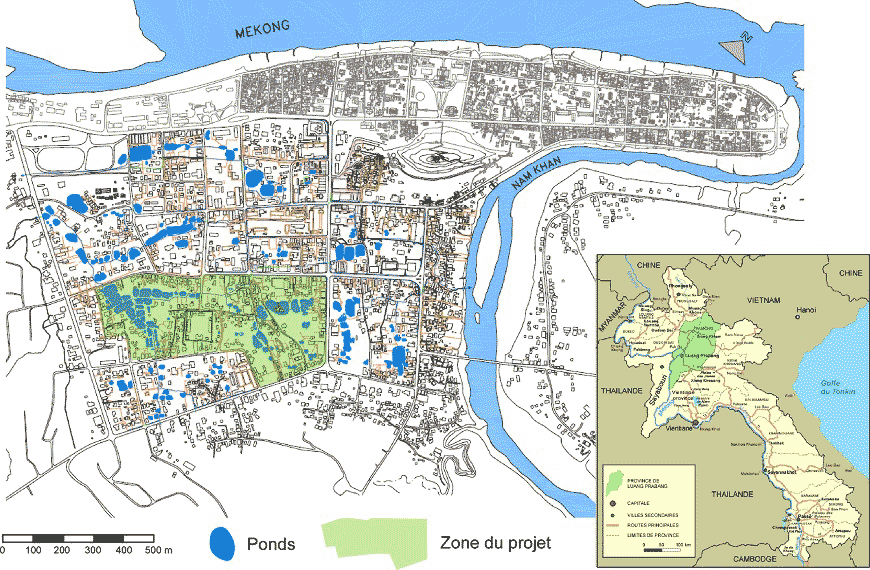The city of Luang Prabang, in Laos, has a network of interconnected urban ponds that are listed as a UNESCO World Heritage site. These wetlands are ideal for fish farming and are crucial for the city’s resilience to deal with the consequences of climate change. However, they are under serious threat from land pressure and various sources of pollution. Since 2019, GRET has been supporting residents and local authorities to become collectively organised for the conservation of these ponds.
Located at the heart of a mountainous region, Luang Prabang is striving to preserve its architectural heritage while reconciling tourism and tradition. Thanks to its rich cultural legacy, the city was listed as a UNESCO World Heritage site in 1995. Its ancient temples, traditional houses, colonial buildings and wetlands make it unique.
Tourism is vital for the province’s economy, as it generates numerous jobs and substantial income. However, its rapid rate of growth is creating real estate pressure that is threatening the population’s way of life.
The manmade network of ponds is one of the elements that led to the site’s inclusion on the UNESCO World Heritage list. These ponds, most of which are privately owned, play a part in mitigating flood risks, household waste water treatment and cooling the city.
However, since the 2000s, despite stringent protective regulation, these ponds have been deteriorating alarmingly, and are gradually disappearing. The city does not have a sewerage system and residents use autonomous sanitation systems with varying levels of quality. Consequently, the ponds are frequently polluted by wastewater. In addition, traditional fish culture and aquaculture practices are being abandoned, thereby reducing the population’s interest in the ponds. According to the local authorities, of the 183 ponds present in 1999, only 120 remain today. This has led to higher flood risks, which are further exacerbated by climate change.
Given the failings of pond management by local public authorities and private stakeholders, the commons-based approach emerged as a promising alternative for the conservation of this world heritage. The objective of the approach is to involve all parties concerned in decisions regarding the urban ponds. This enables mobilisation of diverse representations in favour of shared joint management of these fragile areas. The WISE project intends to contribute to improving the local population’s environment and living conditions, through better management of the urban wetlands in Ban Mano, one of 72 villages in Luang Prabang that are located in the city’s protected area.
GRET defines the commons as a social organisation dynamic. The commons designate the way in which individuals and institutions mobilise collectively, and define a set of actions and rules making it possible to conserve a resource, a service or a territory on which they depend. In Luang Prabang, the commons-based approach is being tested in collaboration with the municipality and the World Heritage Office, with a view to developing an innovative model of governance of the urban ponds, one of the pillars in the city’s inclusion in the UNESCO World Heritage list.

A serious game, derived from the “Terri’Stories” game, was used to help residents understand the importance of conserving the ponds network. Subsequently, they created a wetlands management village committee, made up of residents, pond owners and public stakeholders. This committee coordinates collective actions for conservation, restoration and sustainable use of ponds in the Ban Mano neighbourhood.
GRET provided support to implement the priority actions defined in the wetlands development and restoration plan. Capacity-building activities were organised, notably on nature-based solutions for wastewater treatment in collaboration with local authorities.
Monitoring and evaluation meetings were held for each activity. These actions contributed to the construction of a shared vision for development of the wetlands, enabling them to be opened to tourists in order to valorise the environment, strengthen its protection and generate income for its upkeep.
Learn more:
